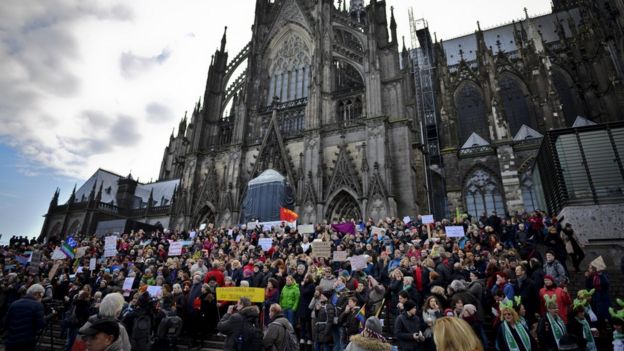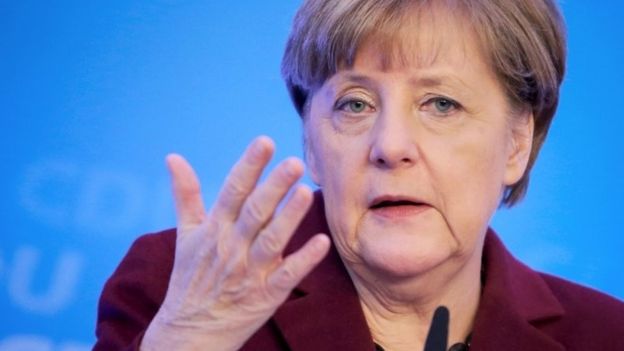- 39 minutes ago
- Europe
Riot police have used water cannon to disperse anti-migrant protesters in the German city of Cologne.
Right-wing groups, headed by the anti-Islam Pegida movement, gathered after reports emerged of a wave of sexual assaults on women on New Year's Eve.
Violence flared after a rally which heard condemnation of Chancellor Angela Merkel's migrant policy.
Mrs Merkel has proposed changes to make it easier to deport asylum-seekers who commit crimes.
Hundreds of police were deployed in Cologne to tackle demonstrators, who threw firecrackers and bottles. Several arrests were made.
Pro-migrant activists held a simultaneous counter-demonstration. Earlier, hundreds of women's right activists rallied in the city.
The New Year's Eve attacks, some of which were carried out by men of North African and Arab appearance, have led to criticism of Mrs Merkel's policies.
The police's handling of the events has also been sharply criticised.
Victims described chaos as dozens of sexual assaults and robberies were carried out with little apparent response from the authorities around Cologne station.
 Getty Images
Getty Images'Consequences'
Mrs Merkel, speaking after a meeting of her Christian Democrat party leadership in Mainz, proposed tightening the law on denying the right of asylum for those who have committed crimes.
Under the new plans, those on probation could be deported too.
 AP
AP
"When crimes are committed, and people place themselves outside the law... there must be consequences," she told reporters after the meeting.
Under current German laws, asylum seekers are only forcibly sent back if they have been sentenced to at least three years' imprisonment, and providing their lives are not at risk in their countries of origin.
The move, which will still need parliamentary approval, follows the New Year's Eve attacks, which sparked outrage in Germany.
Peter Sutherland, the UN Special Representative for Migration, said Mrs Merkel's latest move seemed "entirely appropriate".
He added: "The full application of the criminal law against those who behave in the way that has apparently taken place is appropriate, and they should not be entitled to asylum.
"However, on the other hand, one must not overreact against a whole category of people."

Merkel under pressure - BBC's Anna Holligan in Cologne
Angela Merkel's challenge is to reassure an increasingly pessimistic public that she has a long-term plan. The chancellor showed compassion when she welcomed more than a million refugees and migrants into Germany in 2015. Now she is under pressure to make clear there are limits to German tolerance.
Anti-immigration campaigners have seized on the Cologne incident as an example of what they see as the failure of the country's asylum policy. The prominence of the far-right Pegida movement was fading. It is now using the attacks as a propaganda tool.
On the other side of what is a widening chasm, established Islamic groups here have expressed fears that the actions of a few may jeopardise the future of many.
With tension rising and tolerance waning, Germany's doors remain open, but many here are increasingly asking: For how long and at what cost?

Police also said on Saturday that the number of reported cases of violence on New Year's Eve had risen substantially.
A statement issued by Cologne police on Saturday (in German) said the number had reached 379 - 40% of them cases of sexual assault.
"Those in focus of criminal police investigations are mostly people from North African countries. The majority of them are asylum-seekers and people who are in Germany illegally," the statement said.
Germany has accepted more than a million migrants and refugees in the past year.
Officials have warned that anti-immigrant groups have been trying to use the attacks to stir up hatred.
 Reuters
Reuters
Similar attacks to those seen in Cologne were also reported in Hamburg and in Stuttgart on New Year's Eve. In Bielefeld, hundreds of men tried to force their way into nightclubs, Die Welt reports (in German).
Police said several women had alleged sexual assault.
On Friday, the chief of police for North Rhine-Westphalia was suspended. Wolfgang Albers had been accused of holding back information about the Cologne attacks, in particular about the origin of the suspects.

No comments:
Post a Comment